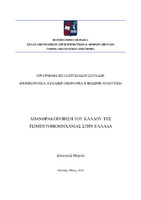Απανθρακοποίηση του κλάδου της τσιμεντοβιομηχανίας στην Ελλάδα
Decarbonization of the Greek cement Industry

View/
Keywords
Αέρια του θερμοκηπίου ; Greenhouse gases ; Τσιμεντοβιομηχανία ; Cement industry ; Ελλάδα ; Greece ; Απανθρακοποίηση ; Decarbonization ; Υποκατάσταση ορυκτών καυσίμων ; Substitution of fossil fuels ; Υποκατάσταση κλίνκερ ; Substitution of clinker ; Εξοικονόμηση ενέργειας ; Energy saving ; Εναλλακτικό κλίνκερ ; Alternative clinker ; Δέσμευση CO2 ; CO2 captureAbstract
The cement industry, known for its significant contribution to global CO2 emissions, is a target sector for climate change mitigation. This master's thesis explores the decarbonisation potential of the Greek cement industry, focusing on reduction measures and initiatives tailored to the unique context of the country and the companies operating in it. Through a comprehensive analysis of international frameworks and practices, a range of mitigation measures are examined, from the substitution of fossil fuels and clinker and the incorporation of alternative clinkers in the final product to the improvement of energy efficiency and the application of CO2 capture techniques, which can be applied at the national level. In the study, emissions from fuel combustion and processes that take place during the production of the cement are included, ignoring indirect emissions related to the supply chain. The methodology is based on the comparison of emissions corresponding to three reduction scenarios (conservative, moderate and ambitious) with the BAU case scenario in the target year and the base year, more specific for years 2030 and 2021 respectively. The analysis underscores the importance of adopting innovative technologies, such as carbon capture, for effectively reducing CO2 emissions, particularly in the context of the sector's development within the country, which entails a rise in cement demand.


